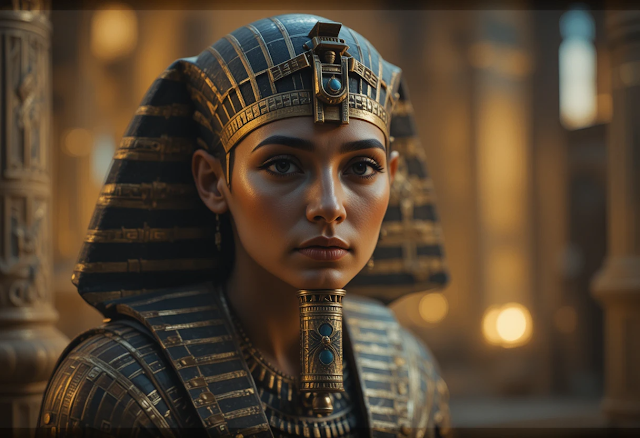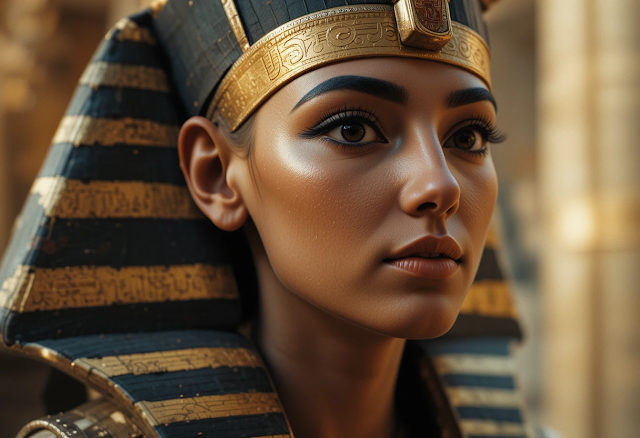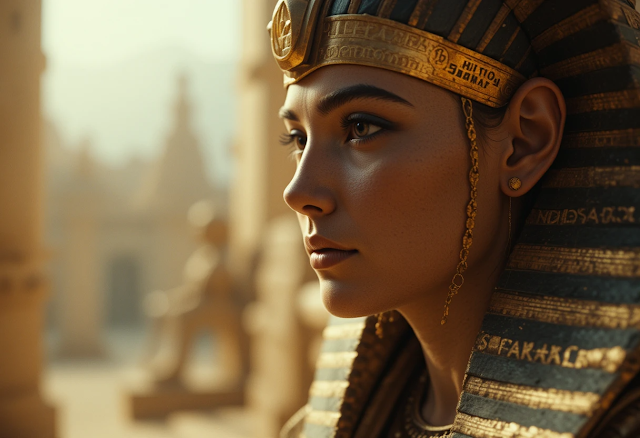The Legacy of Hatshepsut: A Study of the Female Pharaoh
This document explores the life and reign of Hatshepsut, one of ancient Egypt's most remarkable pharaohs. As a female ruler in a predominantly male-dominated society, Hatshepsut's legacy is characterized by her ambitious building projects, trade expeditions, and her unique approach to governance. Through five sections, we delve into her early life, ascension to power, major achievements, religious significance, and her lasting impact on Egyptian history. Each section is enriched with quotes attributed to Hatshepsut, providing insight into her thoughts and philosophies.
Early Life and Ascension to Power
Hatshepsut was born into the royal family around 1507 BC, the daughter of Pharaoh Thutmose I and Queen Ahmose. Her early life was marked by privilege and education, which prepared her for her future role as a leader. After the death of her husband, Thutmose II, Hatshepsut took on the role of regent for her stepson, Thutmose III, but soon declared herself pharaoh.
- "I am the daughter of the god Amun, and I shall rule as a king."
- "The throne is my birthright, and I will not be denied."
- "In the shadow of my father, I learned the ways of leadership."
- "I will not be a mere regent; I will be a pharaoh."
- "The gods have chosen me to lead; I will not falter."
- "My heart is strong, and my will is unyielding."
- "I have the blood of kings in my veins."
- "The time has come for a woman to wear the crown."
- "I will forge my own path in the annals of history."
- "Let my reign be a testament to the power of a woman."
Major Achievements
Hatshepsut's reign is noted for its extensive building projects, including the magnificent mortuary temple at Deir el-Bahari. She also revitalized trade networks, particularly with Punt, which brought wealth and resources to Egypt. Her achievements reflect her ability to govern effectively and her vision for a prosperous Egypt.
- "My temple shall stand as a beacon of my accomplishments."
- "Trade is the lifeblood of our nation; I will expand our reach."
- "The riches of Punt shall flow into our land."
- "I have built monuments that will endure for eternity."
- "Let the world know of my greatness through my works."
- "In every stone, my legacy is carved."
- "I will bring prosperity to my people."
- "The wealth of Egypt shall be unmatched."
- "My reign shall be marked by abundance and peace."
- "I will leave a legacy that will inspire generations."
Religious Significance
Hatshepsut's reign was also marked by her devotion to the gods, particularly Amun. She positioned herself as a divine ruler, often depicting herself in male form to assert her authority. Her religious policies reinforced her legitimacy and the stability of her reign.
- "I am the living embodiment of the god Amun."
- "Through my devotion, I shall secure the favor of the gods."
- "I will honor the divine with my actions."
- "The gods have granted me the strength to lead."
- "In their name, I shall build temples and monuments."
- "My faith is unwavering, and my purpose is clear."
- "I will ensure that the gods are pleased with my reign."
- "Let my devotion be a guiding light for my people."
- "I am a servant of the divine, chosen to lead."
- "In the eyes of the gods, I am both king and queen."
Challenges and Opposition
Despite her successes, Hatshepsut faced challenges during her reign, including opposition from traditionalists who believed a woman should not rule. Her stepson, Thutmose III, would later attempt to erase her legacy, but her accomplishments remained influential.
- "I will not be swayed by those who doubt my strength."
- "Opposition only fuels my resolve to succeed."
- "I shall rise above the challenges that confront me."
- "Let them speak; my actions will speak louder."
- "I will not allow my gender to define my capabilities."
- "In adversity, I find my true power."
- "I will face my detractors with courage and wisdom."
- "My reign shall not be diminished by their fears."
- "I am a pharaoh, and I will not be silenced."
- "History will remember my name, regardless of their attempts."
Lasting Impact and Legacy
Hatshepsut's legacy is one of strength, innovation, and resilience. She paved the way for future female leaders and left an indelible mark on Egyptian history. Her story continues to inspire discussions about gender and power in leadership.
- "I have shown that a woman can rule with wisdom and strength."
- "Let my story inspire those who come after me."
- "I will be remembered not just as a queen, but as a pharaoh."
- "My legacy is a testament to the power of perseverance."
- "In every heart that beats for justice, I live on."
- "I have broken barriers and shattered ceilings."
- "The future belongs to those who dare to dream."
- "I will not be forgotten; my spirit endures."
- "Let my reign be a lesson in courage and ambition."
- "I am Hatshepsut, and my name shall echo through time."
Hatshepsut's reign as pharaoh was a remarkable chapter in ancient Egyptian history. Her ability to navigate the complexities of leadership as a woman in a patriarchal society is a testament to her strength and vision. Through her monumental achievements, religious devotion, and resilience against opposition, Hatshepsut not only solidified her place in history but also paved the way for future generations. Her legacy continues to resonate, reminding us of the potential for greatness that exists within all leaders, regardless of gender.










